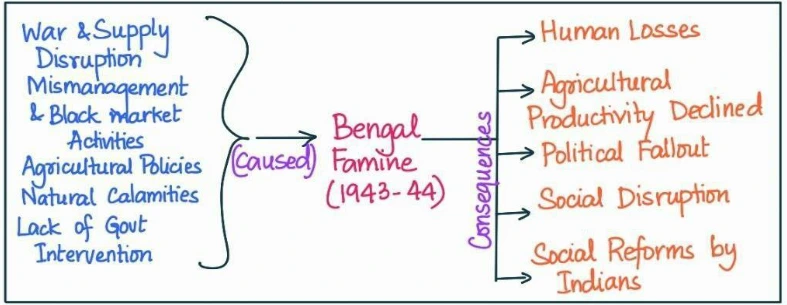Answer:
|
How to approach the question
- Introduction
- Write about the Bengal famine.
- Body
- Write about the causes of the Bengal famine that occurred during British rule.
- Write about the repercussions of the Bengal famine that occurred during British rule.
- Conclusion
- Give appropriate conclusion in this regard.
|
Introduction
Bengal famine (1943-1944) regarded as one of the most devastating humanitarian crises in modern history. It was a catastrophic event characterized by widespread starvation, malnutrition, and disease that led to the death of around 3 million Bengalis.

Body
Colonial factors that led to Bengal famine during the British rule:
- Supply Disruption: The Japanese occupation of Burma (present-day Myanmar) disrupted the rice supply from the region, which was a major source of food for Bengal.
- War time policy of Churchill Cabinet: Fearing Japanese invasion, British authorities stockpiled food to feed defending troops, and they exported considerable quantities to British forces in the Middle East, causing food shortage in India, specially in Bengal.
- Mismanagement and Hoarding: The British Raj’s policies favoured the interests of the British Empire, and the failure to address the hoarding and black-market activities worsened the famine conditions.
- Agricultural Policies: Large areas of arable land were devoted to cash crops, resulting in a decline in the production of essential food grains. Apart from that the British policies like Permanent Settlement had already impoverished the farmers.
- Natural Calamities: 1942 cyclone in Bengal destroyed crops and infrastructure, exacerbating the already dire food situation.
- Lack of Government Intervention: The British Raj’s response to the famine was delayed, and relief efforts were insufficient, resulting in widespread suffering and loss of lives.
Repercussions of the Bengal Famine during British rule in India:
- Human Losses: Estimates suggest that between 2 to 3 million people died due to starvation, malnutrition, and related diseases.
- Economic Impact: Agricultural productivity declined significantly, leading to a decline in food production and loss of livelihoods worsening poverty and economic inequalities. People consumed the grain that was stored for seed, leading to production losses.
- Political Fallout: This event further fuelled the demand for independence and strengthened the resolve of Indian leaders in their struggle against British colonial rule.
- Social Disruption: Instances of migration, displacement, and the breakdown of traditional support systems were widespread.
- Reforms and Policies: The tragic consequences of the famine brought about a greater attention to ensuring food security and welfare measures in independent India.
Conclusion
The Bengal famine of 1943 had far-reaching consequences leaving a lasting impact on Indian society. The famine underscored the urgency for independence and highlighted the need for a more equitable and responsive governance system in India.
To get PDF version, Please click on "Print PDF" button.


Latest Comments